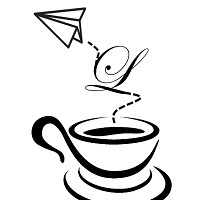What’s a Caffè letterario? And why is it Conviviale?
In 1304, Dante Alighieri starts writing a book, the Convivio, which can be considered almost revolutionary in its purpose. It is a philosophical treatise , made up of four (out of the fourteen programmed) comments on songs and poems about various topics, all written by Dante himself a few years earlier. The comment is a literary genre common among medieval authors, but the choice to write the book in volgare (everyday language), instead of Latin, in order to make the content available to a wider audience, was remarkable and courageous in those times. The convivio (which means “supper”, “banquet”) refers to the “blessed canteen” at which the wise men sat. They eat the “bread of the angels” (wisdom, knowledge), while the majority of the people cannot afford this noble dish.
Dante, in spite of his low-ranked origins, manages to get close to that canteen and to pick up come of the crumbs which lie there on the floor. He was able to gather knowledge and ideas on different topics and to learn Latin too. Nonetheless, he is aware that many others, the broad majority, haven’t enjoyed his same luck, for they’ve been hectic with “civil and household worries”. He also knows that, as Aristotle teaches in his Metaphysics, “every person is naturally eager for knowledge”, and, moved by his “natural friendship towards his kinsmen”, he wants to share through this work the sense he has gained so far. A high aim, described by some as “democratic”, and deeply inspired by Aristotle’s philosophy.

Let’s move a few centuries forward, till the 60s of the XVIII century, in the middle of the Enlightenment. We are in Milan, in the house of a wealthy young man, Pietro Verri, where a dozen members of the local intelligentsia, peers and friends, usually meet to talk about a wide range of matters, from Law to Astronomy, from Agriculture to Literature. This is just one of the thousands salons, teahouses, coffee bars and clubs scattered across Europe; they have taken the place of universities and monasteries, as a new breeding ground of human progress.
But this very lounge is slightly different from all the other Italian ones. Indeed, this is the birth place of Il Caffè, a weekly magazine about general knowledge, different from traditional journals. There the reader will find articles about “various topics […] all aimed at public usefulness”, as Pietro Verri writes in the first copy of the magazine. Il Caffè aims at being available to as many readers as possible, not only to a few experts. Therefore the authors use a clear and effective style, in order to discuss a wide range of subjects and not make the audience bored, rather interested.
These are the models we’ve been looking up to, whose goals we share: sharing knowledge, as a moral duty and a way of acting as conscious citizens, yet in a joyful, cosy and “conviviale” environment. Our group came together in October 2019, started by four classmates, with the common purpose of organizing a few meetings of a literary café (caffè letterario), during the school assemblies at Magrini Marchetti High School (Gemona del Friuli – Italy). Noticing a fair number of students interested in this activity, almost by chance, we came across the idea of starting and running this website, where to publish our thoughts and so leave a footprint of this project.
